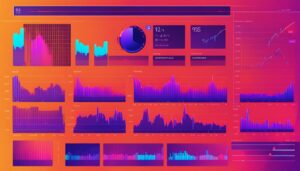Forex scalping is a short-term trading strategy that aims to profit from small price movements in the forex market. It involves opening and closing trades within minutes or even seconds, making quick profits on small price fluctuations. Scalping strategies often rely on technical analysis tools and indicators, such as Bollinger Bands, moving averages, and RSI, to identify entry and exit points. Traders who employ scalping must have excellent risk management skills and the ability to make quick decisions. The forex market provides ample opportunities for scalping due to its high liquidity and volatility.
Key Takeaways:
- Forex scalping is a short-term trading strategy that aims to profit from small price movements.
- Scalping strategies rely on technical analysis tools and indicators to identify entry and exit points.
- Risk management skills are crucial for successful forex scalping.
- The forex market offers high liquidity and volatility, making it suitable for scalping.
- Traders must be able to make quick decisions when scalping in the forex market.
Popular Indicators for Forex Scalping
When it comes to forex scalping, traders rely on various indicators to identify profitable trading opportunities. These indicators provide valuable insights into the market’s volatility, price trends, and overbought or oversold conditions. Here are some of the most popular indicators used by forex scalpers:
- Bollinger Bands: These indicators consist of a moving average and two standard deviation lines. They are effective in identifying market volatility and can help scalpers determine potential entry and exit points.
- Moving averages: Scalpers often use simple moving averages (SMA) or exponential moving averages (EMA) to identify short-term price trends. These indicators smooth out price fluctuations and provide a clearer picture of the market’s direction.
- Relative Strength Index (RSI): The RSI is a momentum oscillator that measures the strength and speed of price movements. It is commonly used to identify overbought or oversold conditions, indicating potential reversals or corrections in the market.
- Stochastic oscillators: Stochastic oscillators are momentum indicators that compare the closing price to the price range over a specific period. They help identify potential turning points in the market and can be useful for scalpers.
- Keltner channels: Keltner channels consist of a central moving average line and upper and lower channels. They provide a framework for identifying price trends and potential breakouts, assisting forex scalpers in making informed trading decisions.
It’s important for scalpers to choose indicators that work best for their trading style and time frame. Experimentation and customization are key to developing a successful forex scalping strategy.
Taking Scalping to the Next Level
“The use of technical indicators can enhance the accuracy of scalping strategies and improve trading outcomes. However, it’s essential to remember that indicators are tools, not magic wands. Traders must still rely on their analysis, risk management, and market understanding to be consistently profitable in forex scalping.”
Combining the right indicators with a robust risk management strategy can help forex scalpers achieve better results. It’s also crucial to stay disciplined and patient, as scalping requires quick decision-making and efficient execution.
In the next section, we will explore some practical tips for successful forex scalping.
Tips for Successful Forex Scalping
Forex scalping is a high-paced trading strategy that requires precision and disciplined execution. To enhance your scalping strategy and achieve consistent profitability, here are some valuable tips to consider:
1. Develop a Scalping Forex Strategy: Before diving into scalping, it is crucial to have a well-defined strategy. Determine your preferred time frame, select appropriate indicators, and establish clear entry and exit rules. A robust Forex scalping system provides a structured approach, increasing your chances of success.
2. Focus on Volatile Currency Pairs: Volatility is the lifeblood of scalping. Trade currency pairs that exhibit significant price movements and liquidity, such as the EUR/USD, GBP/USD, or USD/JPY. Higher volatility increases the number of potential trading opportunities, leading to more profitable trades.
3. Manage Risk Effectively: Scalping involves taking numerous trades within a short timeframe, making risk management critical. Set appropriate stop-loss orders to limit potential losses and adhere to strict money management principles. By limiting your risk per trade, you can preserve your capital and protect yourself from substantial drawdowns.
4. Master Technical Analysis: Technical analysis is an integral part of scalping. Utilize various technical indicators, such as moving averages, MACD, or RSI, to identify entry and exit points. Ensure you have a good understanding of these indicators and how they interact with price action. Strong technical analysis skills will help you make informed trading decisions.
Implementing these tips can significantly enhance your Forex scalping strategy, improving your chances of consistent profitability. Remember, practice, discipline, and continuous learning are essential for mastering the art of forex scalping.
FAQ
What is Forex scalping?
Forex scalping is a short-term trading strategy that aims to profit from small price movements in the forex market.
How does forex scalping work?
Forex scalping involves opening and closing trades within minutes or even seconds to make quick profits on small price fluctuations.
What indicators can be used in forex scalping?
Popular indicators used in forex scalping include Bollinger Bands, moving averages, RSI, stochastic oscillators, and Keltner channels.
Why is the forex market suitable for scalping?
The forex market is suitable for scalping due to its high liquidity and volatility, providing ample opportunities for quick trades and profits.
What skills are necessary for successful forex scalping?
Successful forex scalping requires excellent risk management skills, the ability to make quick decisions, and a solid understanding of technical analysis tools.
How can I improve my scalping strategy?
Some tips to improve your scalping strategy include careful planning, proper risk management, selecting suitable indicators, and practicing quick decision-making.





